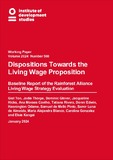Dispositions Towards the Living Wage Proposition: Baseline Report of the Rainforest Alliance Living Wage Strategy Evaluation
| dc.contributor.author | Ton, Giel | |
| dc.contributor.author | Thorpe, Jodie | |
| dc.contributor.author | Glover, Dominic | |
| dc.contributor.author | Hicks, Jacqueline | |
| dc.contributor.author | Moraes Coelho, Ana | |
| dc.contributor.author | Rivera, Tatiana | |
| dc.contributor.author | Edwin, Donni | |
| dc.contributor.author | Odame, Hannington | |
| dc.contributor.author | de Mello Pinto, Samuel | |
| dc.contributor.author | Luna, Samir | |
| dc.contributor.author | Blanco, Maria | |
| dc.contributor.author | Gonzalez, Carolina | |
| dc.contributor.author | Kangai, Elsie | |
| dc.coverage.spatial | Brazil | en |
| dc.coverage.spatial | Colombia | en |
| dc.coverage.spatial | Indonesia | en |
| dc.coverage.spatial | Kenya | en |
| dc.date.accessioned | 2024-01-26T11:51:31Z | |
| dc.date.available | 2024-01-26T11:51:31Z | |
| dc.date.issued | 2023-01-26 | |
| dc.identifier.citation | Ton, G. et al. (2024) Dispositions Towards the Living Wage Proposition: Baseline Report of the Rainforest Alliance Living Wage Strategy Evaluation, IDS Working Paper 598, Brighton: Institute of Development Studies, DOI: 10.19088/IDS.2024.002 | en |
| dc.identifier.isbn | 978-1-80470-171-3 | |
| dc.identifier.issn | 2040-0209 | |
| dc.identifier.uri | https://opendocs.ids.ac.uk/opendocs/handle/20.500.12413/18212 | |
| dc.description.abstract | This paper reflects on the changes induced by modifications in the Rainforest Alliance certification system that require wage transparency from plantation owners, a comparison with the local living wage benchmark, and a wage improvement plan. The paper synthesises the findings of four case studies in Brazil, Colombia, Indonesia, and Kenya, covering plantations of coffee, bananas, and tea. It finds that the socio-technological proposition is highly contested in the sector. Certification holders fear the costs of the wage improvement plans without credible long-term commitments from downstream firms and brands to support them financially. The effects of the change in the Rainforest Alliance 2020 Sustainable Agriculture Standard, Farm Requirements, Version 1.2 (RA2020) are still limited and largely constrained to sectors where downstream buyers have piloted living wage premium modalities. The paper highlights the limits to the private regulation of wages in a segmented value chain and recommends a standard volume-based living wage premium paid by international brands, which is transferred to local committees with producer and worker representatives that could manage a cash transfer system using mobile banking and support collective bargaining. | en |
| dc.description.sponsorship | Rainforest Alliance | en |
| dc.language.iso | en | en |
| dc.publisher | Institute of Development Studies | en |
| dc.relation.ispartofseries | IDS Working Paper;598 | |
| dc.rights | The paper is distributed under the terms of the Creative Commons Attribution 4.0 International licence (CC BY), which permits unrestricted use or distribution in any medium, provided the original authors and sources are credited and any modifications or adaptations are indicated. | en |
| dc.rights.uri | http://creativecommons.org/licenses/by/4.0/ | en |
| dc.subject | Trade | en |
| dc.subject | Work and Labour | en |
| dc.title | Dispositions Towards the Living Wage Proposition: Baseline Report of the Rainforest Alliance Living Wage Strategy Evaluation | en |
| dc.type | IDS Working Paper | en |
| dc.rights.holder | Institute of Development Studies | en |
| dc.identifier.team | Business, Markets and the State | en |
| dc.identifier.doi | 10.19088/IDS.2024.002 | |
| dcterms.dateAccepted | 2023-01-26 | |
| rioxxterms.funder | Default funder | en |
| rioxxterms.identifier.project | Default project | en |
| rioxxterms.version | VoR | en |
| rioxxterms.versionofrecord | 10.19088/IDS.2024.002 | en |
| rioxxterms.funder.project | e4b8632d-62dd-4f31-9936-43860ac26f9a | en |
Files in this item
This item appears in the following Collection(s)
-
IDS Research [1671]
Except where otherwise noted, this item's license is described as The paper is distributed under the terms of the Creative Commons Attribution 4.0 International licence (CC BY), which permits unrestricted use or distribution in any medium, provided the original authors and sources are credited and any modifications or adaptations are indicated.


